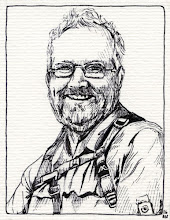
The Sepia Saturday prompt this week is, rather unusually, an image of a bas relief sculpture. I'm stretching the third dimension somewhat, but I think my offering fits the bill quite well.

Unidentified man in colonial uniform, Burma, c.1920s-1930s
Loose silver gelatin print (91 x 115mm) by unknown photographer
Image © and collection of Brett Payne
It was the 110th anniversary of George Orwell's birth last week, so what better opportunity to use this loose paper print from my collection. Sadly it has lost all provenance, and I have no idea who the colonial wallah in his solar topee and tropical khaki uniform was, but the inscription on the back clearly identifies it has having been taken in Burma. I estimate it to have been taken in the 1920s and, since Orwell (aka Eric Arthur Blair) served with the Indian Imperial Police in Burma from October 1922 until July 1927, they were quite possibly colleagues and may well have known each other.
I've looked at several hundred images of seated Buddhas in arched niches trying to find this particular one to no avail, so I'm hoping that a reader will one day be able to identify where this snapshot was taken.

No 3 Autographic Kodak Model G
Image © and courtesy of the Tauranga Heritage Collection
The 3¼" x 4¼" format implies it was printed from 118, 119 or 124 format film, which in turn suggests that the photographer used a roll film camera such as the No 3 Autographic Kodak Model G (above) or the Blair No 3 Folding Hawkeye Model 3 (below).

Blair No 3 Folding Hawk-Eye Model 3
Image © and courtesy of the Tauranga Heritage Collection

I hope you will like this Photo better than the last one it was taken by my mate
the figure by which I am standing is one of the Budhas which the Burmese worship

Eric Blair (back row, 3rd from left), 1923
Police Training School, Mandalay, Burma
In an essay written some years later, Orwell makes it clear that he spent five formative years working in a job he despised, and in a position which left him feeling incredibly uncomfortable.
I had already made up my mind that imperialism was an evil thing and the sooner I chucked up my job and got out of it the better ... All I knew was that I was stuck between my hatred of the empire I served and my rage against the evil-spirited little beasts who tried to make my job impossible. With one part of my mind I thought of the British Raj as an unbreakable tyranny, as something clamped down, in saecula saeculorum, upon the will of prostrate peoples; with another part I thought that the greatest joy in the world would be to drive a bayonet into a Buddhist priest's guts. Feelings like these are the normal by-products of imperialism; ask any Anglo-Indian official, if you can catch him off duty
... when the white man turns tyrant it is his own freedom that he destroys. He becomes a sort of hollow, posing dummy, the conventionalized figure of a sahib. For it is the condition of his rule that he shall spend his life in trying to impress the "natives," and so in every crisis he has got to do what the "natives" expect of him. He wears a mask, and his face grows to fit it.
George Orwell, Shooting an Elephant

The British Club in Katha, Myanmar (Burma)
Image © Aung Shine Oo and courtesy of The New York Times
In 1927, during sick leave in England, Orwell finally made the decision to resign from the service to become an author and never returned to Burma. His experiences there formed the basis of his first major work, Burmese Days and, some would argue, were instrumental in developing the political beliefs which pervaded all of his subsequent work.
... it is a corrupting thing to live one's real life in secret. One should live with the stream of life, not against it.
George Orwell, Burmese Days
Most have heard of, if not read, Orwell's seminal works, Animal Farm and 1984. If you haven't already done so, I think his lesser known works, such as Burmese Days, Down and Out in Paris and London, Road to Wigan Pier and Homage to Catalonia are well worth adding to your reading list.References
Quotes from Burmese Days by George Orwell, on Goodreads.
Orwell, George (1936) Shooting an Elephant, New Writing, 2, Autumn 1936.
Perlez, Jane (2013) In Myanmar Outpost, a Fading Orwellian Link, The New York Times, 23 May 2013.
George Orwell [The Characteristics of Burmese Days], on Ba Kaung, 17 Oct 2007.







